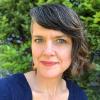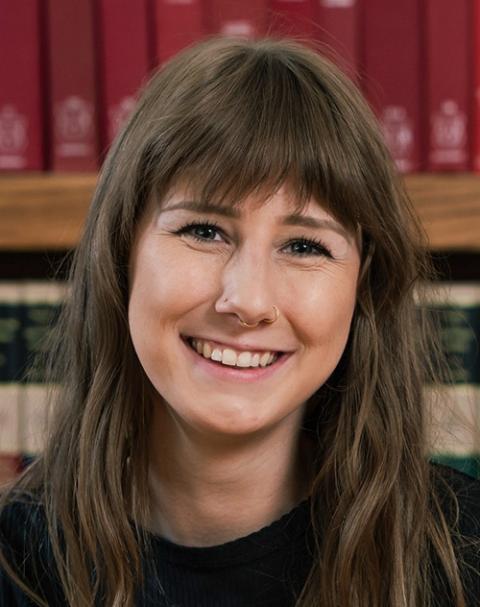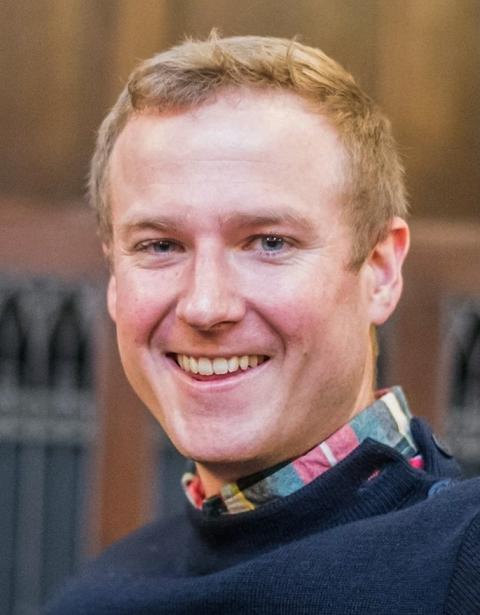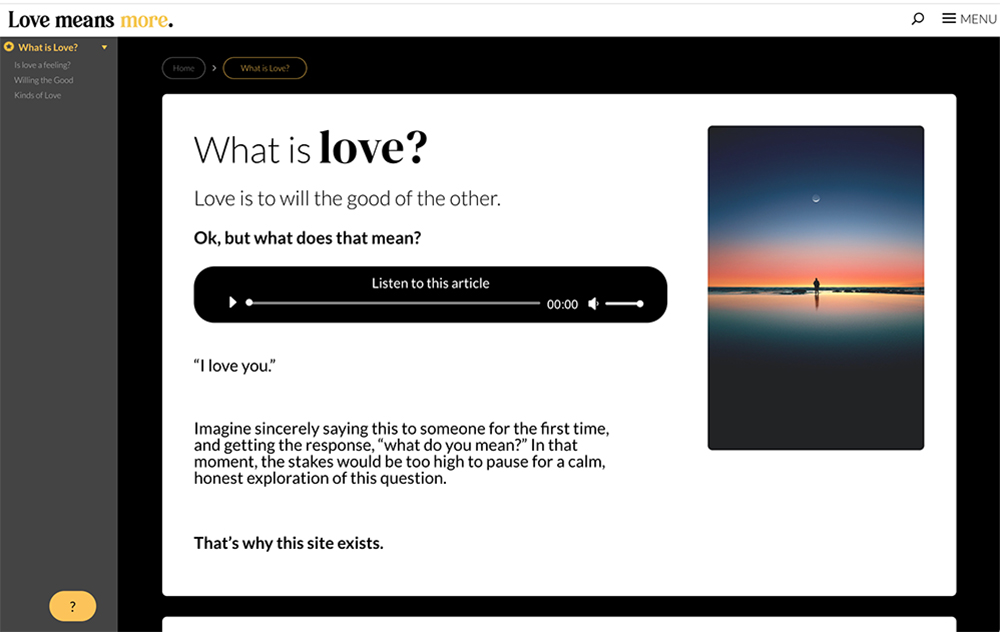
The U.S. Conference of Catholic Bishops' new website on love, sexuality and marriage, "Love means more," was launched this year and seeks to engage people with diverse ideological and faith backgrounds. (NCR screenshot)
When Bernie Donlon, a 25-year-old Catholic who last year earned a master's degree in theology, first clicked through a new website launched by the U.S. bishops, she was intrigued by the "choose your own adventure" interactive format and its stated intent to explore love as "more than the narrow notions that get tossed around."
As Donlon, who identifies as queer, continued from page to page, however, she became increasingly concerned about the approach and content.
"If I'd done a Google search and stumbled upon this when I was younger, I think it would have had me take a few steps back in my personal journey with gender expression and sexuality," she said. "It speaks in a superlative way in my opinion and one that doesn't invite or engage in dialogue or listening."
Earlier this year, the U.S. Conference of Catholic Bishops' Committee on Laity, Marriage, Family Life and Youth launched a campaign based around the website, called "Love means more." With a sharp design, audio options and images of racially and ethnically diverse young people, the site takes a Socratic-method-type approach and tackles numerous topics — divorce, marriage, gender identity, sexual orientation, pornography, parenthood — beginning with the question: "What is love?"
Bishop Robert Barron of Winona-Rochester, Minnesota, founder of the Catholic media organization Word on Fire, is chairman of the committee. In a press release announcing the initiative, Barron said conversations around love, family and sexuality "can be confusing and polarizing" and that he therefore was pleased the new initiative could help "bring clarity and compassion to those questions."
The website, according to the press release, is directed toward a range of individuals, from catechists to "seekers" from different religious backgrounds — or none at all.
Yet Donlon and other Catholics, including a psychologist, theologians and a mother of a transgender child, told NCR the website contains inaccuracies, does not reflect LGBTQ people's experiences, and overall fumbles in its mission to reach people with differing ideological and religious views.
NCR asked Chieko Noguchi, the bishops' spokesperson, about these and other critiques but did not receive a response. Barron had not responded to an interview request prior to publication.
Noguchi previously said committee members consulted with a wide variety of individuals, among them bishops, pastors, educators, medical and mental health professionals, and lay Catholic leaders involved with family life ministry.
The initiative, according to the press release also "heard, and seeks to address, questions and concerns received from people who are uncomfortable with some Church teachings," including "those who uphold the possibility of divorce and remarriage, LGBT-identifying individuals, and those who defend pornography."
"Love means more" comes as Catholics voice sharply divergent views about transgender people. It will replace the bishops' "Marriage: Unique for a Reason" website, created in 2010 when a growing number of states legalized same-sex marriage.
In a March interview with Catholic Review Radio in the Baltimore Archdiocese, Andrew Buonopane, assistant director for marriage and family life in the U.S. bishops' Secretariat on Laity, Marriage, Family Life and Youth, said that in the crafting of the website they wanted to understand "the wounds" that people "are bringing to this, so that we don't run roughshod over those" and to show that "healing from those wounds is really possible with the truth that the church has taught and continues to teach."
Woundedness is infused in the way many people of faith think about gender dysphoria and sexuality, said Julia Sadusky, a Catholic psychologist in Colorado who frequently helps conservative Christian families navigate or understand the realities of gender dysphoria.
Advertisement
"Few people who act contrary to the truth about human sexuality do so for purely philosophical motivations," reads the "About" section on the website. "Instead, personal wounds are typically at the core of misunderstandings and errors."
After having studied a great deal of research, "the most honest and accurate answer is that we don't know specifically" what causes gender dysphoria or a person's sexual orientation, Sadusky said, adding it seems to be a combination of nurture and nature.
"As soon as we start to pontificate beyond that, I think we are going to lose quite a bit of credibility to people who don't already believe that narrative about wounds causing those experiences," she said.
Jason Steidl Jack, a gay Catholic and an assistant teaching professor of religious studies at St. Joseph's University in New York, said he found the website's phrasing about woundedness to be "incredibly paternalistic and condescending — as if the only reason why people would believe anything other than what the bishops are saying is that they are broken or wounded people."
"The LGBTQ community is not broken because of our sexuality," he said. "We're not broken because of our gender, gender expression, gender self-understanding. We're broken because we live in a world that is homophobic, transphobic."
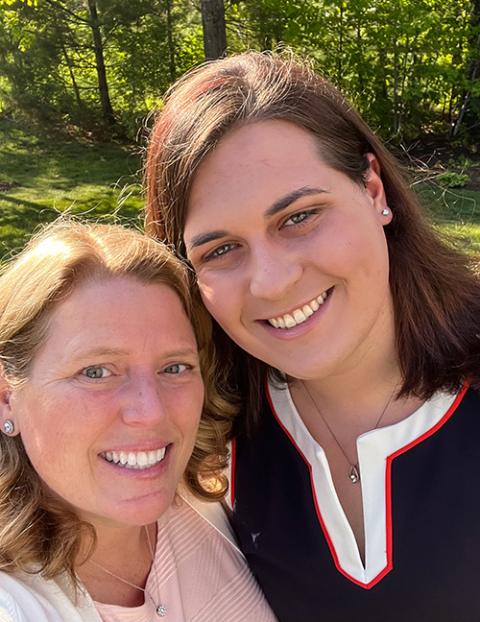
Jennifer MacNeil, pictured with her transgender daughter, Willow, said the U.S. bishops' website contains inaccuracies and is out of touch with young people. Such content "pushes people further from the church," MacNeil told NCR. "But I'm not going to back down. I'm allowed to have my faith and to be a Catholic woman with a transgender child." (Courtesy of Jennifer MacNeil)
Topics on the website often begin with a scenario intended to reflect real-life situations. Under "gender discordance," a person named Rob "never felt right" being a boy and was bullied for caring more about theater than sports.
The webpage suggests that "instead of implying that liking theater more than sports makes someone a girl," it would be helpful for a friend to acknowledge that "Rob is a man without forcing him to abide by certain stereotypes."
Jennifer MacNeil is a Catholic mother of three children, including a transgender daughter, in New Hampshire. MacNeil read the page on gender discordance with her sons, and all felt the narrative used outdated troupes that have long been rejected by most young people, she said.
Ultimately the website "is a slap in the face," said MacNeil, "and emboldens members of my faith community to act out against transgender people."
Sadusky told NCR many individuals not trained in mental health think gender dysphoria is caused by rigid stereotyping.
"Too often I think we assume that gender dysphoria is either purely a moral concern, or it's a cognitive problem to be disputed," she said. "And I don't know of anybody I've worked with who has gender dysphoria who would experience the resolution of it simply by somebody telling them they're allowed to be a boy who prefers gender nonconforming activities."
A section on divorce and remarriage focuses on no-fault divorce, saying it harms relationships because it makes it harder for couples to engage in difficult conversation without fearing one party can easily leave.
"In a world without no-fault divorce," reads the website, "Melissa," the wife in the fictional scenario, might have had "the peace of mind to know that she could talk honestly with Neil about what's bothering her, without fearing the consequences."
Sadusky said no-fault divorce has "some very clear benefits," and it enabled women to leave marriages that were abusive or high-conflict.
"We can pick no-fault divorce as the villain in that story, but I don't think it impacts conflict in the way they are framing it here, and it can be very helpful for people to get out of an abusive dynamic," she said.
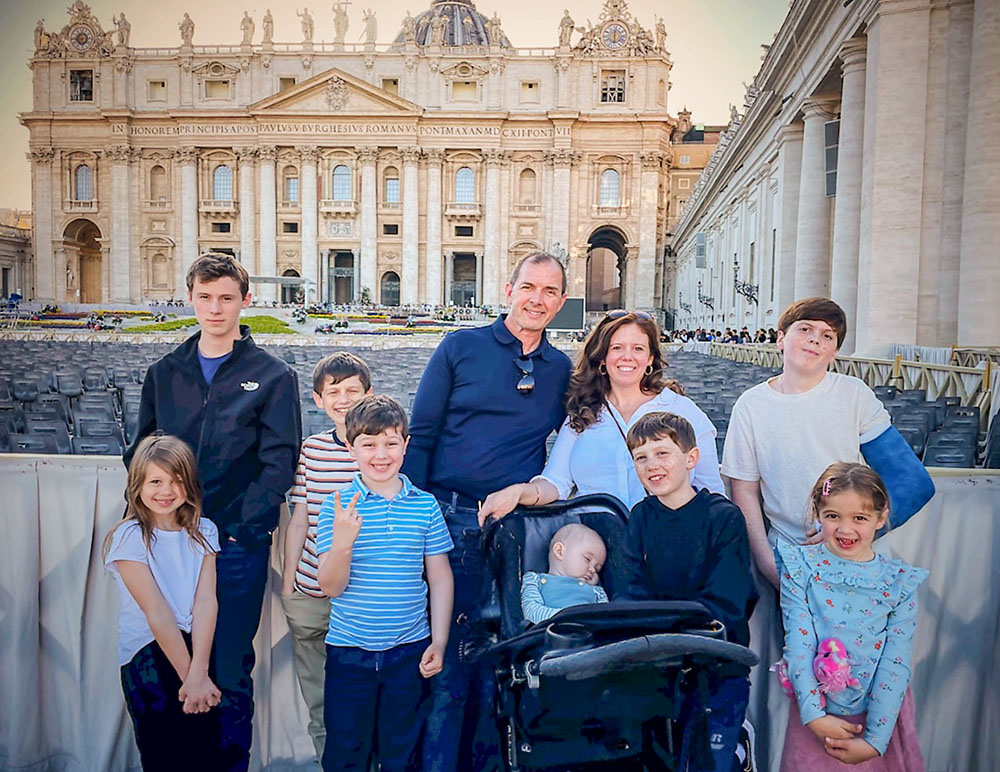
Melinda Ribnek poses with her family in St. Peter's Square at the Vatican in April. "I think the Holy Spirit consistently moves through the church," said Ribnek. "And we are in a period where the Holy Spirit is speaking from these marginalized communities, and also to the church, and in time I have hope that we'll come to an understanding that respects both the heart of the church's teachings but with a deep and understanding of the hardest things in context of these issues." (Courtesy of Melinda Ribnek)
Melinda Ribnek is a Catholic mother of eight in Savannah, Georgia, who is finishing her master's degree in clinical mental health counseling.
She said in an interview with NCR she's distressed at how the website suggests consent is not always necessary within a marriage because it may impede intimacy. (The site acknowledges abusers can wrongly use such a view to justify wrongdoing and emphasizes the need for communication.)
The approach is "deeply irresponsible" given the rate of domestic violence and abuse in unhealthy heterosexual marriages, said Ribnek.
Donlon, recently hired as is digital communications and programs coordinator for the Catholic LGBTQ advocacy group New Ways Ministry, said she understands and can appreciate that the website is grounded in Christian anthropology but that it doesn't seem to take into account LGBTQ people's real-life experiences.
In addition, the philosophical arguments are at times confusing or use a logic and language that only makes sense if you already accept church teachings, said Donlon, adding she feels hopeful the bishops may consider revamping the website.
Steidl Jack agreed that "Love means more" would be largely unintelligible to people who don't embrace a Catholic worldview.
"I would rather send someone to the Catechism of the Catholic Church because it lays out church teaching very clearly," he said.
A list of resources on the website features works on marriage from legal and theological perspectives, a parenting book co-authored by Catholic Answers apologist Trent Horn, and links to the Chastity Project and the Person and Identity Project.
Chastity Project founder Jason Evert is slated to speak at the U.S. bishops-sponsored National Eucharistic Congress in Indianapolis this July.
The Person and Identity Project, an initiative backed by a conservative think tank and with broad influence in the church, adopts right-wing talking points and features controversial medical organizations. One of its founders, Mary Rice Hasson, is an adviser to the committee spearheading the website.
Sadusky said she worries that if time and again people look for Catholic resources on gender, sexuality and love and "all that they encounter is the apologetic domain," they will think the church has nothing of value to offer in the pastoral realm except for "cognitive engagement with theory."
They will see the church as unfamiliar with additional needs beyond that and unable to give "support in the field hospital that is our lives," said Sadusky.
"Who is going to come to the church, who is going to come to Jesus, who's going to come to the richness of the magisterium through this website?" added Ribnek. "I don't think it's going to be effective for anyone who is not already in conservative Catholic bubbles."
Buonopane, in the radio interview, said that the website does not "compromise the truth" but that it does not seek to condemn.
"I encourage pastors and parents and educators to check out the site," said Buonopane, and to give feedback about how it "could be better molded to their experience or the people they are dealing with."
